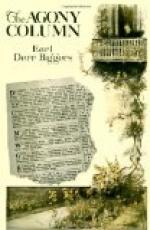And Colonel Hughes threw down upon the inspector’s desk the knife from India that I had last seen in the study of Captain Fraser-Freer.
“All these points of evidence were in my hands yesterday morning in this room,” Hughes went on. “Still, the answer they gave me was so unbelievable, so astounding, I was not satisfied; I wanted even stronger proof. That is why I directed suspicion to my American friend here. I was waiting. I knew that at last Von der Herts realized the danger he was in. I felt that if opportunity were offered he would attempt to escape from England; and then our proofs of his guilt would be unanswerable, despite his cleverness. True enough, in the afternoon he secured the release of the countess, and together they started for the Continent. I was lucky enough to get him at Dover—and glad to let the lady go on.”
And now, for the first time, the startling truth struck me full in the face as Hughes smiled down at his victim.
“Inspector Bray,” he said, “or Von der Herts, as you choose, I arrest you on two counts: First, as the head of the Wilhelmstrasse spy system in England; second, as the murderer of Captain Fraser-Freer. And, if you will allow me, I wish to compliment you on your efficiency.”
Bray did not reply for a moment. I sat numb in my chair. Finally the inspector looked up. He actually tried to smile.
“You win the hat,” he said, “but you must go to Homburg for it. I will gladly pay all expenses.”
“Thank you,” answered Hughes. “I hope to visit your country before long; but I shall not be occupied with hats. Again I congratulate you. You were a bit careless, but your position justified that. As head of the department at Scotland Yard given over to the hunt for spies, precaution doubtless struck you as unnecessary. How unlucky for poor Fraser-Freer that it was to you he went to arrange for your own arrest! I got that information from a clerk at the Cecil. You were quite right, from your point of view, to kill him. And, as I say, you could afford to be rather reckless. You had arranged that when the news of his murder came to Scotland Yard you yourself would be on hand to conduct the search for the guilty man. A happy situation, was it not?”
“It seemed so at the time,” admitted Bray; and at last I thought I detected a note of bitterness in his voice.
“I’m very sorry—really,” said Hughes. “To-day, or to-morrow at the latest, England will enter the war. You know what that means, Von der Herts. The Tower of London—and a firing squad!”
Deliberately he walked away from the inspector, and stood facing the window. Von der Herts was fingering idly that Indian knife which lay on his desk. With a quick hunted look about the room, he raised his hand; and before I could leap forward to stop him he had plunged the knife into his heart.
Colonel Hughes turned round at my cry, but even at what met his eyes now that Englishman was imperturbable.




